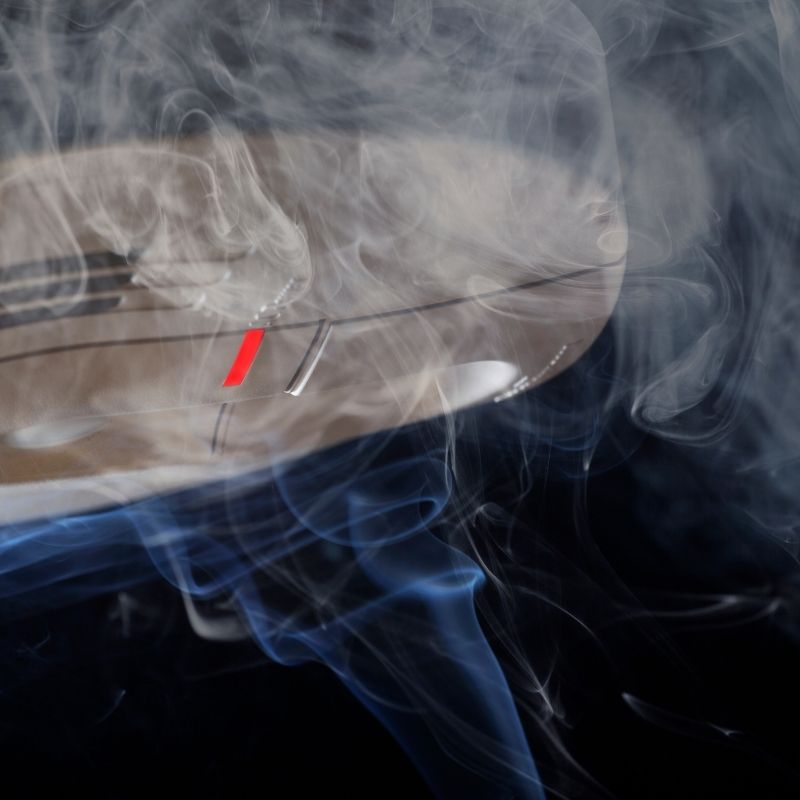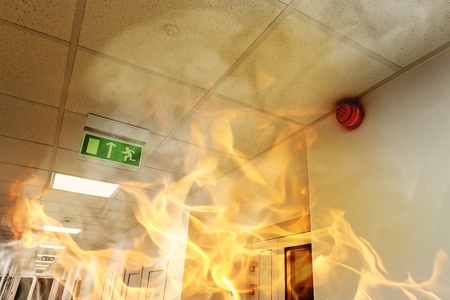
This article was published on 11/1/2016 and updated on 1/13/2022
The two most common types of smoke detection technologies include ionization smoke detectors and photoelectric smoke detectors. Each type of smoke alarm detects the presence of smoke differently.
Ionization vs. Photoelectric Smoke Detection
Ionization Smoke Detectors
Ionization smoke detectors operate because they have a small amount of radioactive material which is located in between two electrically charged plates. This ionizes the air which creates a current to flow in between the two plates. This flow of ions is disrupted when smoke enters the chamber. The reduction in the flow of current activates the alarm. Ionization smoke alarms tend to respond quicker than photoelectric smoke detectors to smoke that is produced from a flaming fire, although will not signal an alarm until a fire has become sufficient enough to produce enough smoke to reach the alarm.
Photoelectric Smoke Detectors
Photoelectric smoke detectors operate with a continuous, focused beam of light onto a mirror from an LED light source that is aimed directly into a sensing chamber, away from the sensor. If smoke enters the chamber, the light that is reflected onto the light sensor is interrupted, scattering light in many directions and triggers the alarm. Photoelectric smoke detectors tend to respond quicker than ionization smoke alarms to smoke that is produced by a smoldering fire. Photoelectric smoke detectors can detect smoke before a fire even begins to appear.
You can learn more about the difference between ionization vs. photoelectric smoke detection from the National Fire Protection Association, NFPA. Each type of smoke detection technology provides advantages that may be critical to saving lives in certain fire situations.
Smoke Inhalation Is the Leading Cause of Death by Fire
The NFPA reports that more fire deaths are caused by smoke inhalation then by burns. People caught in a fire become incapacitated quickly when overwhelmed with smoke which prevents them from making it to and accessible exit. All of the synthetic materials that are common in construction today create especially dangerous and toxic substances during a fire. As a fire gains momentum inside of a structure, it quickly consumes most of the available oxygen, which promotes a slow burning process and results in toxic gases.
Which Type of Smoke Alarm Is Best?
It is difficult to predict the type of fire that you may have in your home or business. Whether a blazing, flaming fire or a smoldering fire, early warning is critical to prevent injury and save lives. A licensed fire alarm and life safety system provider can help you determine which type of smoke detection technology is best for your property and buildings.
Some buildings benefit from utilizing both ionization and photoelectric technologies, although it is recommended that photoelectric smoke detection definitely be present. . Photo photoelectric smoke detectors can detect the presence of smoke as soon a fire begins to develop to alert occupants for quick evacuation. Dual smoke alarms are available that include both ionization and photoelectric smoke detection technology.
HRSS/SMG Explains Smoke Detection Technology
High Rise Security Systems, HRSS, with SMG Security Holdings, SMG is a leading fire and life safety system provider in the state of Illinois offering decades of expertise in commercial fire alarm system design and smoke detection technology. We help our customers with full fire and life safety system design, providing the right type of smoke detection technology exactly where you need it. We are a premier distributor for NOTIFIER™ by Honeywell, which is recognized as a technology leader in fire detection. NOTIFIER offers state-of-the-art smoke detection systems, including self-testing smoke detectors, the first UL listed self-testing smoke alarms on the market.
HRSS/SMG offers fire alarm system design, testing, inspection, repairs, maintenance, and monitoring 24/7/365. We will review your current fire alarm and smoke detection system and recommend the best solution for your facility. Contact us to learn more about the different types of smoke alarms and photoelectric smoke detection technology.



